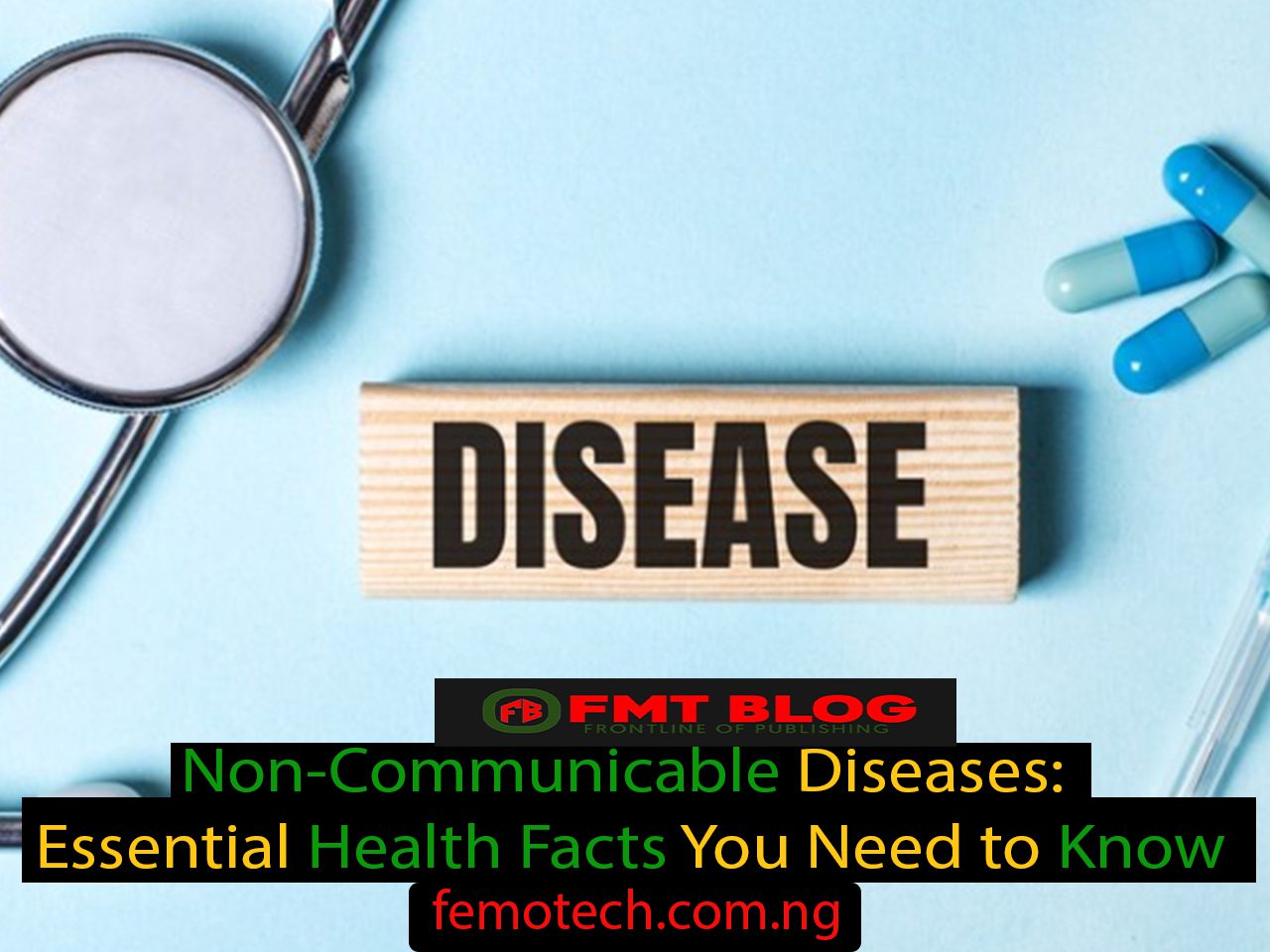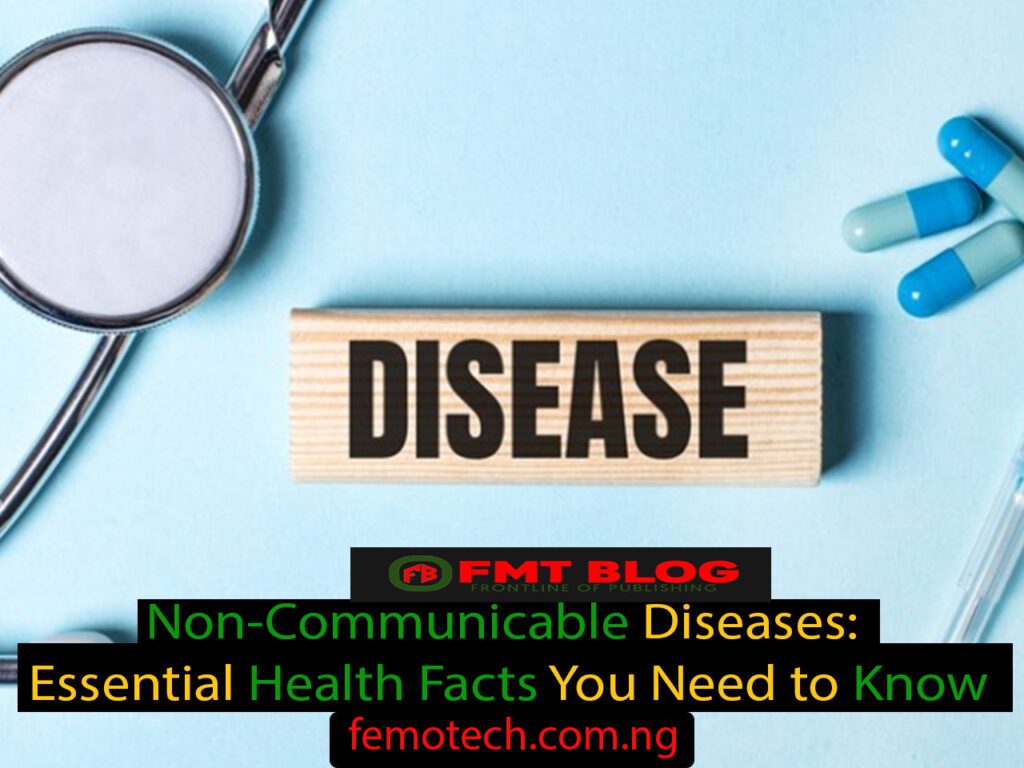
Uncover the truth about Non-Communicable Diseases (NCDs) – the leading cause of death globally.

Introduction
Many times, we consider transmissible diseases like the flu or COVID-19 to be the main hazards to our health in modern society. But another class of diseases, called non-communicable diseases (NCDs), is silently behind more deaths worldwide than communicable diseases.
What are Non-communicable diseases, or NCDs
Unlike communicable diseases such as a cold, which occur person-to-person, NCDs are chronic conditions that are not passed on through contact. Imagine your preferred pair of jeans; with time, wear and tear could cause holes or loss of shape. Likewise, different lifestyle choices and genetic predispositions shape NCD development throughout time. These chronic illnesses can seriously affect your well-being and general state of health. Here are some common examples you might be familiar with:
- Heart Disease: This is the leading cause of death worldwide, affecting millions each year. Think of your heart as a tireless pump that keeps you alive. In heart disease, clogged arteries and inefficient blood flow make it harder for your heart to do its job.
- Stroke: This happens when blood flow to the brain is interrupted, causing brain cells to die. Imagine losing control over half your body or struggling to speak clearly – these can be some of the scary consequences of a stroke.
- Cancer: This group of diseases involves abnormal cell growth that can spread to other parts of the body. Imagine a lump in your breast or difficulty swallowing – these could be early signs of cancer.
- Chronic Respiratory Diseases: These include conditions like asthma and chronic obstructive pulmonary disease (COPD) that make breathing difficult. Imagine struggling to climb stairs or feeling constantly short of breath – this is the reality for many people with chronic respiratory diseases.
- Diabetes: This condition affects how your body regulates blood sugar levels. Imagine feeling constantly thirsty, fatigued, or having blurry vision – these can be signs of diabetes.
Someone once said to me, “I have a sweet tooth, so my weakness is fatty foods and sugary drinks. You know how life gets in the way; I always meant to start working out.” Examining this behavior, it’s clear that such habits can significantly increase the risk of major non-communicable diseases (NCDs) like type 2 diabetes, heart disease, and even certain cancers. This insight wakes him awake and emphasizes the importance of choosing better foods and changing his way of life to lower these hazards.
Essential Facts About Non-Communicable Diseases (NCDs)
Top Cause of Death: Did you know that non-communicative diseases, or NCDs for short, are the major killer worldwide today, according to the World Health Organization (WHO)? That is correct! NCDs cause more than seven of every ten fatalities worldwide. Non-communicative diseases, therefore, account for more than 70% of all deaths globally.
Risk Factors: Many of the things we do every day can influence our risk of developing NCDs. Here’s a closer look at some of the key lifestyle choices that can increase your chances of getting an NCD:
- Unhealthy diet: A diet high in unhealthy fats, processed foods, added sugar, and salt can contribute to NCDs like heart disease, stroke, type 2 diabetes, and some cancers. These foods can lead to weight gain, high blood pressure, and unhealthy cholesterol levels.
- Physical inactivity: Not getting enough exercise is a major risk factor for many NCDs. Regular physical activity helps you maintain a healthy weight, manage blood pressure and cholesterol levels, and improve overall health.
- Tobacco use: Smoking tobacco is one of the leading causes of preventable death worldwide. It damages your lungs, heart, and blood vessels and increases your risk of cancer, heart disease, stroke, and lung diseases like COPD.
- Excessive alcohol consumption: Drinking too much alcohol can raise your blood pressure and increase your risk of heart disease, stroke, liver disease, and some cancers.
Hidden Threat: Unlike some illnesses with immediate symptoms, NCDs often develop slowly. You might not experience any warning signs until the later stages of the disease, making them a hidden threat to your health.
Global Burden: NCDs affect people of all ages, genders, and backgrounds. But unfortunately, the burden is often heavier on low- and middle-income countries where access to healthcare and preventative measures can be limited.
Early detection: Early detection and treatment can significantly improve the outlook for people with NCDs. Catching an NCD early, when symptoms may be mild or even nonexistent, allows for prompt intervention. This intervention can help slow or even prevent the progression of the disease. For example, if high blood pressure is detected early, lifestyle changes and medication can be used to bring it under control.
This can help prevent a heart attack or stroke down the road. Early detection also allows for better management of symptoms. For example, people with diabetes who are diagnosed early can learn how to manage their blood sugar levels through diet, exercise, and medication. This can help prevent serious complications, such as blindness, kidney failure, and nerve damage.
Management is Possible: While some NCDs, like certain cancers or advanced stages of heart disease, cannot be completely cured, they can often be effectively managed with a combination of treatment approaches. This management can significantly improve a person’s quality of life and help them live longer. Here’s a breakdown of some common management strategies for Non-Communicable Diseases:
- Medication: Doctors may prescribe medications to control symptoms, slow disease progression, or reduce the risk of complications. For example, people with diabetes may take medication to regulate their blood sugar levels, while those with high blood pressure may take medication to lower their blood pressure.
- Lifestyle Changes: Making healthy lifestyle changes is often a cornerstone of managing NCDs. This may involve eating a healthy diet, getting regular exercise, maintaining a healthy weight, quitting smoking, or limiting alcohol intake. These changes can help improve your overall health and well-being, and in some cases, they may even help slow the progression of your Non-Communicable Diseases.
- Medical Care: Regular visits with your doctor are important for monitoring your NCD, managing your medications, and checking for any potential complications. Early detection and treatment of complications can significantly improve your health outcomes.
Economic Impact: Non-communicable diseases (NCDs) are a major financial burden on healthcare systems and economies around the world. This burden includes the direct costs of medical care for people with Non-Communicable Diseases, such as hospital stays, doctor visits, medications, and rehabilitation. It also includes indirect costs, such as lost productivity due to illness and premature death. These costs can be staggering. According to the World Bank, Non-Communicable Diseases cost the global economy trillions of dollars each year. This money could be used to invest in other important areas, such as education and infrastructure. In addition, NCDs can lead to a decrease in the workforce, as people with chronic illnesses may be unable to work full-time or may retire early. This can have a negative impact on a country’s economic growth.
Lifestyle Choices Matter: The choices you make every day, big and small, can significantly impact your risk of developing NCDs. These choices include what you eat, how much you move your body, and the substances you consume. For example, a diet high in processed foods, sugary drinks, and unhealthy fats can increase your risk of obesity, heart disease, and diabetes. On the other hand, a diet rich in fruits, vegetables, and whole grains can help you maintain a healthy weight and reduce your risk of chronic diseases. Similarly, physical inactivity is a major risk factor for Non-Communicable Diseases. Aiming for at least 30 minutes of moderate-intensity exercise most days of the week can significantly improve your health and well-being. Finally, tobacco use and excessive alcohol consumption are both major risk factors for NCDs. Quitting smoking and limiting alcohol intake are two of the most important things you can do to reduce your risk of chronic diseases.
Small steps make a difference. Even small changes in your daily routine can significantly reduce your risk of NCDs. Here are some easy tips to get you started:
- Swap sugary drinks for water: Sugary drinks like soda, juice drinks, and sports drinks are loaded with hidden sugars. These can contribute to weight gain, diabetes, and heart disease. Replacing sugary drinks with water is a simple but effective way to cut back on sugar and improve your overall health. Aim to drink eight glasses of water per day. If plain water is too boring for you, add a slice of lemon, cucumber, or other fruit for a natural flavor boost.
- Add more fruits and vegetables to your diet: Fruits and vegetables are packed with essential vitamins, minerals, and fiber. They can help you feel full and satisfied, reduce your risk of chronic diseases, and improve your overall health. Aim to fill half your plate with fruits and vegetables at each meal. Start by adding a piece of fruit to your breakfast, a side salad to your lunch, or roasted vegetables to your dinner. There are endless possibilities when it comes to incorporating more fruits and vegetables into your diet!
Follow us on socials → Telegram | X/Twitter | Facebook | WhatsApp |WhatsApp Channel |Mobile App
Conclusion
Your chances of developing these chronic diseases will be much lowered if you know the hazards and work toward a better way of life. Recall that little modifications add up to a great difference. Start by include more fruits and vegetables into your diet, obtaining regular exercise, and choosing deliberately what you eat and drink. Knowledge and preventive actions can help you enable yourself to lead a long, healthy life free from Non-Communicable Diseases burden.



